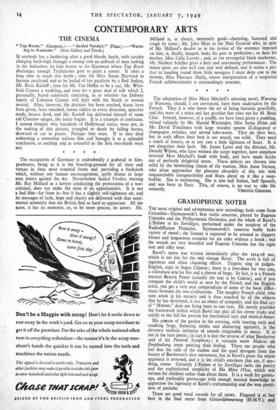CONTEMPORARY ARTS
THE CINEMA
" Tap Roots." (Gaumont.)---" Sealed Verdict." (Plaza.)—"Warn- Mg to Wantons." (New Gallery and Tivoli.)
IF anybody has a hankering after a good bloody battle, with cavalry charging hock-high through a swamp into an ambush of men lurking in the bulrushes, let him hasten to the Gaumont where Tap Roots discharges enough Technicolor gore to paint a sunset. It takes a long time to reach this battle ; time for Miss Susan Hayward to become paralysed and to be healed of her paralysis by a Red Indian, Mr. Boris Karloff ; time for Mr. Van Heflin to be a cad, Mr. Whit- field Connor a weakling,.and time for a great deal of talk which I, personally, found extremely confusing, as to whether the Dabney family of Lebanon County will fight with the South or remain neutral. After, however, the decision has been reached, kisses have been given, faces smacked, horses ridden in every direction, speeches made, houses fired, and Mr. Karloff has delivered himself of some old Choctaw adages, the battle begins. It is a triumph of confusion. I canno) imagine why hundreds of Hollywood extras were not, in the making of this picture, trampled to death by falling horses, drowned or cut to pieces. Perhaps they were. If so they died redeeming a somewhat tedious film and brought it to a splendid conclusion, as exciting and as colourful as the first two-thirds were not.
The occupation of Germany is undoubtedly a godsend to film- producers, being as it is the breeding-ground for all vices and virtues in their most essential forms and providing a backcloth which, without any human encouragement, spells drama in large torn letters against the sky. Nevertheless Sealed Verdict, starring Mr. Ray Milland as a lawyer conducting the prosecution of a war- criminal, does not make the most of its opportunities. It is not a bad film—far from it—but it has a slightly self-righteous air, and its messages of faith, hope and charity are delivered with that senti- mental solemnity that the British find so hard to appreciate. All the same, it has its moments, or, to be more precise, its actors. Mr.
Milland is, as always, extremely good—charming, harassed and tough by turns ; Mr. John Hoyt as the Nazi General who, in spite of Mr. Milland's doubts as to the justice of the sentence imposed on him, is, finally, hanged, looks his .part to perfection ; so does his mother, Miss Celia Lovsky ; and, as the revengeful black marketeer, Mr. Norbert Schiller gives a fiery and convincing performance. The minor parts are also well cast and well defined, and it seems a pity that in handing round these little nosegays I must deny one to the heroine, Miss Florence Marty, whose interpretation of a suspected French collaborationist is outstandingly anaemic.
The adaptation of Miss Mary Mitchell's amusing novel, Warning to Wantons, should, I am convinced, have been undertaken by the French. They it is who know the art of being fantastic gracefully, and this story of a minx and her peculiar fate cries out for M. Rene Clair. Instead, however, of a souffle, we have been given a pudding, stirred valiantly by Mr. Harold Warrender, Miss Sonia Holm and Mr. David Tomlinson with large wooden spoons ill-disguised as champagne swizzles, and served Luke-warm. They do their best, but in such affairs their best is too sound, too solid. They need a touch of lunacy, or at any rate a little lightness of heart. It is not altogether their fault. Mr. James Laver and the director, Mr. Donald Wilson, who have written the script together, have somehow invested Miss Mitchell's book with body, and have made bricks out of perfectly delightful straw. These defects are thrown into relief by the bewitching charm of the wanton, Miss Anne Vernon, who alone approaches the pleasant absurdity of this tale with unquenchable irresponsibility and floats about on it like a soap- bubble. She is enchanting. She is also half Italian, half Spanish, and was born in Paris. This, of course, is no way to take life






































 Previous page
Previous page